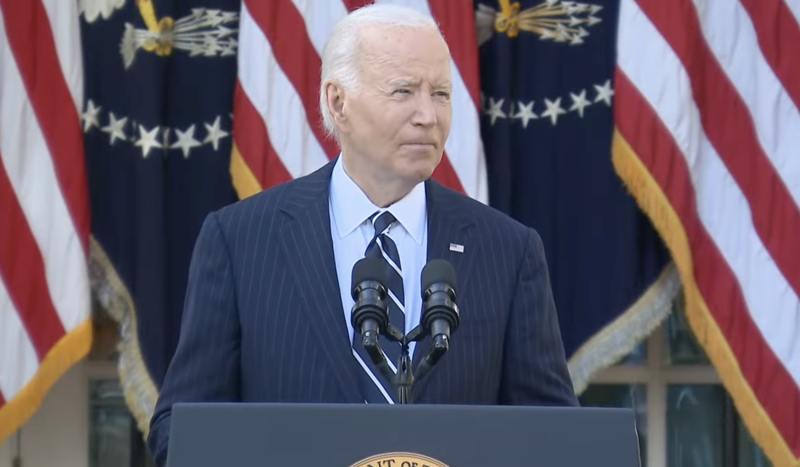President Joe Biden said Thursday that he plans a peaceful transfer of power to President-elect Donald Trump and urged Democrats to stay engaged despite the election loss.
Biden, from the White House Rose Garden, said that he called Trump on Wednesday to congratulate him on winning the election.
“I assured him that I’d direct my entire administration to work with his team to ensure a peaceful and orderly transition,” Biden said. “That’s what the American people deserve.”
Biden said he also spoke with Vice President Kamala Harris on Wednesday.
“She ran an inspiring campaign and everyone got to see something that I learned early on to respect so much: Her character. She’s got a backbone like a ramrod,” he said. “She gave her whole heart.”
He told Democrats to remain engaged.
“You can’t only love your country when you win,” he said.
Biden said Republicans and Democrats should see each other not as adversaries but as fellow Americans.
Biden called his presidency “historic” and said the American people will feel the affect of his policies for decades to come.
“We’re leaving behind the strongest economy in the world,” the president said. “I know people are still hurting, but things are changing rapidly. Together we’ve changed America for the better. Now we have 74 days to finish the term.”
Trump ran on the economy and 40-year-high inflation during his campaign and made bold campaign promises to help Americans with everything from the cost of food and housing to taxing and spending policies. Trump also vowed to reverse Biden’s border policies and deport criminal foreign nationals in the country illegally. At least 14 million illegal border crossings occurred since Biden took office.
Biden pledged to use all of his remaining days in office to continue with his vision for the country.
Biden also urged Democrats not to give up hope.
“We lost this battle,” he said. “The America of your dreams is calling for you to get back up.”
Harris addressed supporters and the nation at her alma mater, Howard University, in Washington, D.C. Wednesday afternoon, where she publicly conceded the race to Trump. Harris – the 60-year-old former California Attorney General and U.S. senator serving as vice president – called for loyalty to the U.S. Constitution and the peaceful transition of power in her speech.
Trump beat Harris in the election both in the popular vote and in the Electoral College, handily winning what pollsters had predicted would be a tight race. Trump had 72,993,733 votes as of Thursday compared to 68,351,712 votes for Harris, with a few milion votes still to be counted, mostly in Blue states. Trump secured 312 Electoral College votes compared to 226 for Harris.
Republicans took control of the U.S. Senate and could take the upper hand in the U.S. House as counting continues in races across the U.S. That could pave the way for a more productive second term for Trump.
Trump wants to extend the 2017 Tax Cuts and Jobs Act provisions, which the Congressional Budget Office has estimated would cost $4 trillion over the next decade without offsetting spending cuts.
Trump has proposed imposing a 10% to 20% across-the-board tariff on all imports and tariffs up to 60% on China to help offset the costs. Trump’s tariff plans haven’t been detailed, confusing budget projections. Experts have found it difficult to gauge how other countries would respond to those tariffs.
“While such measures could raise several trillion dollars in revenue over the next decade, they could also lead to revenue losses from potential retaliatory actions from other countries and other economic losses,” credit-rating agency Moody’s noted in a recent report. “Therefore, the net effect on future revenues and fiscal deficits from such measures is highly uncertain.”
The Penn Wharton Budget Model, a nonprofit group, projects Trump’s overall campaign tax and spending proposals would increase primary deficits by $5.8 trillion over the next 10 years on a conventional basis and by $4.1 trillion on a dynamic basis that includes economic feedback effects.







